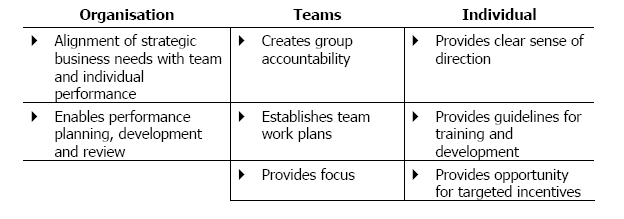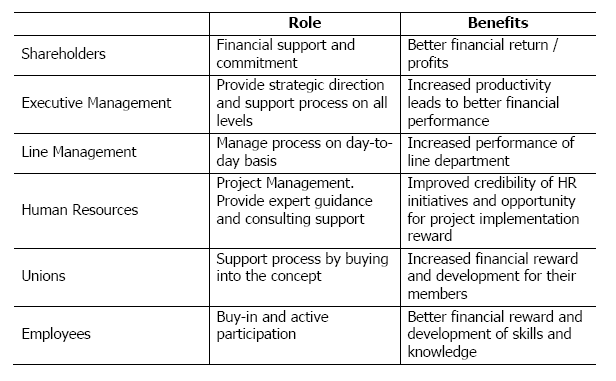Since the 1980’s organisations started to realise the importance of the effective utilisation of people as resources, as opposed to the other resources in the organisation in order to become world class competitors. All organisations are focused on reducing cost, improving quality and increasing productivity. It is important to understand that collectively, the performance of individuals determines that of teams, departments and ultimately, the entire organisation.
A Performance Management System therefore holds benefits for an organisation on three diverse but aligned levels:

Performance Management is an integral part of day-to-day staff management, but it is specifically focused on improving individual performance and developing individual skills and knowledge, which in turn leads to better team and organisation performance.
It is clear that people cannot be effective unless:
- They know what they are supposed to do.
- They are capable of doing it.
- They receive feedback on how they are doing.
The purpose of a performance management system is therefore to:
- Help organisations meet objectives and carry out major initiatives.
- Identify ways in which people can contribute to their work team.
- Provide people with a complete picture of what results are to be achieved and how to achieve them.
- Extend thinking beyond a one-time appraisal to an ongoing, day-to-day process.
- Help people improve their performance, ensuring job success.
We can therefore conclude that the purpose of the performance management process is to translate organisation strategy in such a way that everybody in the organisation understands what his/her specific contribution is in achieving the organisations’ strategy.
Who is Responsible for Performance Management?

Performance management is the responsibility of all stakeholders (shareholders, executive management, line management, human resources, unions and employees).
If developed, implemented and managed correctly, performance management can be to the advantage and advancement of everybody in the organisation.
The different roles and benefits of stakeholders can be summarised as follows:
